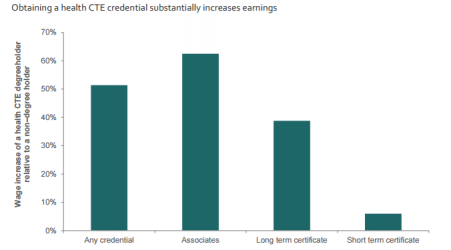 When learners earn an industry certification, they’re not just earning a credential for their resume. They’re also potentially saving money on higher education. It’s no secret that pursuing higher education in the United States comes at a high cost to learners. According to EducationData.org, the average federal student loan debt is $36,510 per borrower, and students with private student loans have debt averaging $54,921 per borrower. Any chance learners can get to earn college credit while in high school is a great move. That’s where ACE CREDIT comes in.
When learners earn an industry certification, they’re not just earning a credential for their resume. They’re also potentially saving money on higher education. It’s no secret that pursuing higher education in the United States comes at a high cost to learners. According to EducationData.org, the average federal student loan debt is $36,510 per borrower, and students with private student loans have debt averaging $54,921 per borrower. Any chance learners can get to earn college credit while in high school is a great move. That’s where ACE CREDIT comes in.
Career Technical Education (CTE) programs across the country are embedding industry-recognized credentials in their programs of study as a measure of program quality and to ensure that learning is validated, recognized, and portable. Certiport offers exams for a number of commonly state-approved certifications. In addition to providing state and local leaders with valuable information about program quality, our exams provide the added learner benefit of conferring ACE credit.
What is ACE CREDIT?
Founded in 1918, the American Council on Education (ACE) is the major coordinating body for all the nation’s higher education institutions, representing more than 1,600 college and university presidents and more than 200 related associations nationwide. It provides leadership on key higher education issues and influences public policy through advocacy.
ACE CREDIT connects workplace learning with colleges and universities by helping adults gain access to academic credit at colleges and universities for formal courses and examinations taken in the workplace or other settings outside traditional higher education. For more than 40 years, colleges and universities have trusted ACE CREDIT to provide reliable course equivalency information to facilitate their decisions to award academic credit. And now, learners who pass select Certiport exams can earn this valuable credit as well.
Which Certiport Exams Qualify for ACE CREDIT?
The American Council on Education’s College Credit Recommendation Service (ACE Learning Evaluations®) has evaluated and recommended college credit for multiple Certiport programs, including:
- Autodesk Certified User
- Adobe Certified Professional
- Communication Skills for Business
- Entrepreneurship and Small Business
- IC3 Digital Literacy
- Intuit
- IT Specialist
- Microsoft Certified Fundamentals
- Microsoft Office Specialist
You can find the full list here.
How Do Learners Obtain ACE College Credit?
Certiport’s partnership with ACE’s Transcript Service makes obtaining college credit simple.
First, learners should verify with their university/college admissions office that they grant credit for the specific certification.
Second, learners should send their transcript to their college or university via Credly’s Acclaim platform. Information on transcript services is available in the ACE Student Resource Center.
Interested in having your certified learners earn college credit? You can learn more here.
Hannah Davis, Certiport, a Pearson VUE business


 Contributing to a growing body of research on the economic benefit of industry credentials, the Public Policy Institute of California last month released a
Contributing to a growing body of research on the economic benefit of industry credentials, the Public Policy Institute of California last month released a 